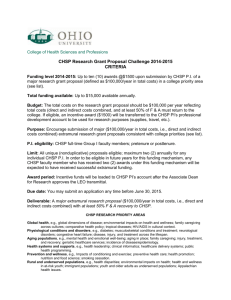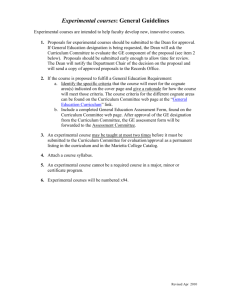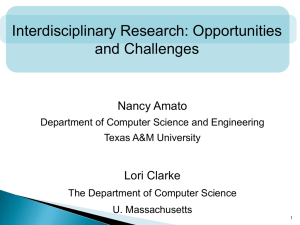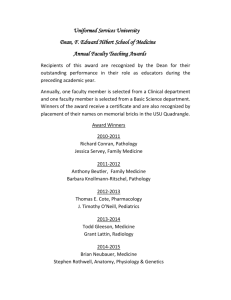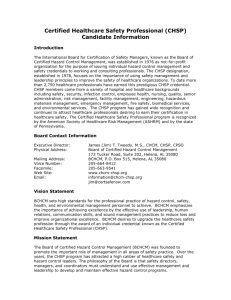CHHS Scholarly Activity Awards
advertisement
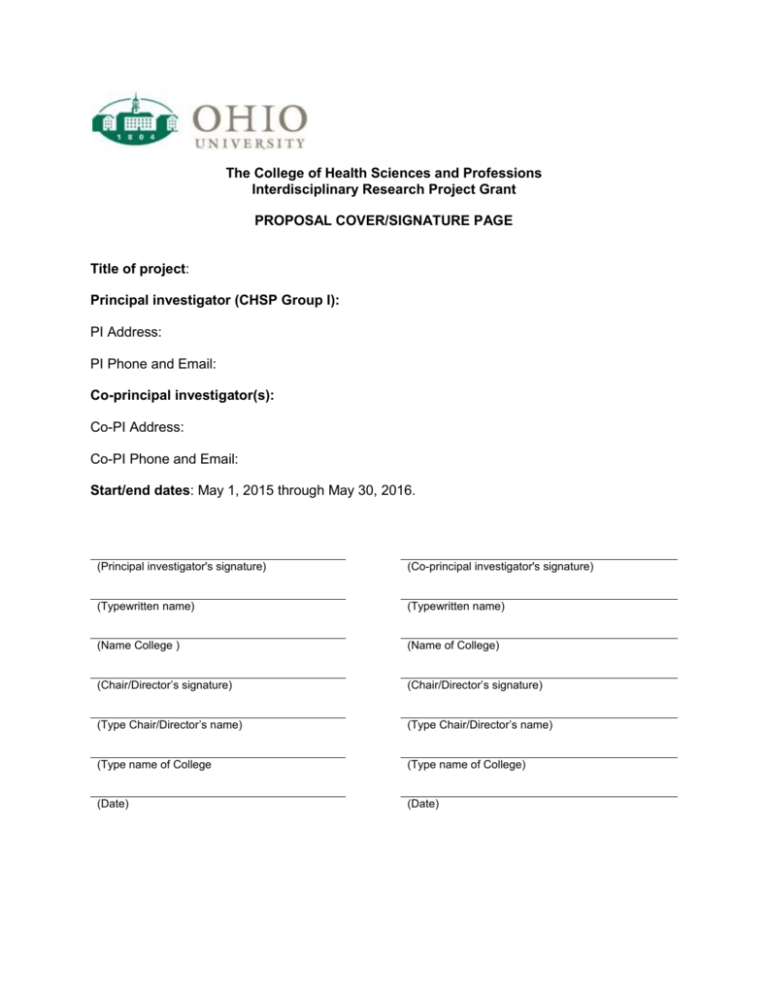
The College of Health Sciences and Professions Interdisciplinary Research Project Grant PROPOSAL COVER/SIGNATURE PAGE Title of project: Principal investigator (CHSP Group I): PI Address: PI Phone and Email: Co-principal investigator(s): Co-PI Address: Co-PI Phone and Email: Start/end dates: May 1, 2015 through May 30, 2016. (Principal investigator's signature) (Co-principal investigator's signature) (Typewritten name) (Typewritten name) (Name College ) (Name of College) (Chair/Director’s signature) (Chair/Director’s signature) (Type Chair/Director’s name) (Type Chair/Director’s name) (Type name of College (Type name of College) (Date) (Date) The College of Health Sciences and Professions Interdisciplinary Research Award (CHSP-IRPG) I. REQUEST FOR PROPOSALS & CALENDAR A. Purpose. The primary purpose of the College of Health Sciences and Professions’ Interdisciplinary Research Project Grant (CHSP-IRPG) is to provide seed money of up to $10,000 for an interdisciplinary research project led by a CHSP Group I pretenure faculty member addressing bench, bedside, or community health research questions. Different programs within a given school or department–or different disciplines across schools/departments or colleges–are eligible to apply if the proposal demonstrates how the collaboration of disciplines/programs enhances the ability to solve research problems that could not be accomplished in a strictly disciplinary line of research. B. Goals. 1. Encourage interdisciplinary partnerships; 2. Facilitate grants leadership experience among CHSP’s pretenure Group I faculty investigators; 3. Position scholars to seek larger extramural grants. C. Preference will be given to: 1. Proposals that clearly and persuasively articulate how the proposed is novel and significant due to its interdisciplinary approach between or among investigators engaged in bench, bedside and/or community health research; and 2. Individuals/teams planning to seek larger extramural grants for their interdisciplinary research. D. Funding available: A maximum of $20,000; up to two (2) CHSP-IRPG proposals may funded in this cycle. Calendar: On or before last Friday in January: Scholarly Activity Award Committee in place. On or before last Friday in January: Nomination due from department chair or school director. February 18, 2015: Nominee submits complete set of materials to CHSP Dean’s Office.* April 17, 2015: CHSP Awards Ceremony. Funding period for the award: 12 months: May 1, 2015 through May 30, 2016. *Combine all pages into one(1) pdf document and submit to hornerj@ohio.edu 2 CHSP Interdisciplinary Research Project Grant (2015-2016) PART II: IMPORTANT INFORMATION A. B. C. D. E. F. G. H. Eligibility Lack of eligibility Reservation Expenditure of Award Funds Review Committee Potential Conflict of Interest Confidentiality Funding Considerations A. Eligibility. 1. The principal investigator will be a CHSP full-time Group I pretenure faculty member, leading a project with a co-investigator or a team of research investigators. The research project must represent the collaboration of at least two academic disciplines or program areas; 2. Proposals should articulate research aims that require an interdisciplinary collaboration, and an approach/ methodology that explicitly describes how the interdisciplinary collaboration will achieve the research aims; 3. Significant pilot work is eligible; 4. Proposals must articulate a plan to apply for an extramural research grant; and, 5. Projects must be accompanied by a letter of support from the Chair/Director of each (co)investigator’s department/school to assure that the scholarly focus is consistent with promotion and tenure policies of each department/school and college, and to assure that the co-investigators have sufficient time and resources to fulfill the purposes of the grant. B. Lack of Eligibility. 1. CHSP-IRPG funds will not be provided to projects relating primarily to teaching, personal development, or administrative functioning. 2. Projects that are part of an advanced degree program of the applicants will not be considered unless all eligibility criteria are met. 3. Projects for curriculum development or the purchase of instructional equipment will not be considered. 4. Projects funded by other sources (intramural or extramural) are not eligible, unless the proposal provides highly persuasive reasons for supplemental funding. C. Reservation. The CHSP Dean reserves the right to fund one or more proposal, or no proposals; the right to suspend the program due to lack of funding availability or other reasons; and, if an award is made, to adjust the budget requested. Furthermore, if serious deficiencies in progress are noted at the time of the progress report, the Dean may elect to curtail/withdraw funding. D. Expenditure of award funds. Award funds must be expended during the 12-month period stipulated in the award letter. Unused funds will be returned to CHSP at the conclusion of the 12-month funding period. There will be no exceptions. 3 CHSP Interdisciplinary Research Project Grant (2015-2016) E. Review committee. Proposals will be reviewed by the CHSP Scholarly Activity Award Committee comprised of faculty representatives from each of CHSP Department/Schools. F. Potential conflict of interest. CHSP Scholarly Activity Award Committee members will be expected to acknowledge potential conflicts of interest that may unduly influence their evaluation of individual proposals under consideration. Committee members will be excused from discussing or voting on proposals if, for example, the committee member is an applicant, or if the committee member is a spouse, partner, mentor/trainee, a coauthor, or a co-investigator of the applicant. Applicants concerned about potential conflicts of interest on the part of any committee member are welcome to express those concerns in confidence to the Associate Dean for Research. G. Confidentiality. The standard for peer-review of grant proposals is that members of the review committee will respect the confidentiality of all proposals reviewed, including the substance of the proposals, the credentials of contributing faculty, the final merit review appraisal, and any information of a novel or proprietary nature. H. Funding considerations. The maximum dollar amount for a CHSP-IRPG is $10,000. Projects funded by other sources (intramural or extramural funding entities) are not eligible, absent a persuasive proposal regarding need for supplemental funding. CHSPIRPG funds may be used, with appropriate justification, for the following: 1. Up to 20% of the budget may be allocated to summer salary support for the CHSP P.I. 2. Up to 10% of the budget may be allocated to travel for the purpose of disseminating the project grant findings. 3. Graduate hourly hires are permissible; Graduate Assistant employees are eligible only if the school/department will commit to providing the tuition waiver. 4. Other eligible costs include: a) Reasonable hourly rate for other key non-faculty personnel or consultants; b) Supplies and small equipment (no single item may be >$5,000); c) Participant costs (human or animal); 4 CHSP Interdisciplinary Research Project Grant (2015-2016) PART III: PROPOSAL PREPARATION GUIDELINES A. Proposal (10 pages maximum) 1. Proposal Cover/Signature Page (1 page) 2. Cover Letter by Applicant (1 page) 3. Support Letter by PI’s Chair/Director (1 page) 4. Narrative (5 pages) 5. Detailed Budget and Justification (2 pages) B. Supplementary material (no page limit) 1. Biosketches for PI and major faculty collaborators 2. Reference List 3. Appendices C. Evaluation Criteria D. Reporting Requirements and Other Expectations Basic proposal requirements include: 1. 2. 3. 4. Use an Arial, 11 points. Use single-spaces throughout the proposal; double-space before major headings. Do not count the biosketches, reference list, or appendices in the total. In the Appendix, include a letter of support from each of the major collaborators, and other key personnel or contributors. 5. Consolidate all parts of proposal into one document (PDF) for the purpose of electronic submission to CHSP’s Associate Dean for Research hornerj@ohio.edu. A. Proposal (10-page limit). 1. Proposal cover/signature page (provided); the cover page is page 1 of the proposal. Signatures should be obtained by the applicant and are required only on the original copy (and a version scanned to PDF). 2. Cover letter by applicant (single-spaced, maximum 1 page; the cover letter is page 2 of the proposal). Briefly describe the purpose, specific objectives and approach. Describe the interdisciplinary collaboration and its novelty and significance. If the PI has existing funding (start-up funding, intramural Ohio University grants; extramural grants) explain how the CHSP internal grant award is essential for project completion. Finally, explain the plan for submitting an extramural grant proposal at the end of the project year. 3. Letter of support from principal investigator’s chair or school director (singlespaced, maximum 1 page). The Chair/Director should express support for the importance of the proposed interdisciplinary project, the need for funding through the CHSP-IRPG mechanism, and support for the proposed line of research in the context of the PI’s annual performance plan, promotion and tenure progress, and other considerations. 4. Narrative (single-spaced, limit 5 pages). The interdisciplinary research proposal should clearly address objectives, methodology, procedures, and interpretation of 5 CHSP Interdisciplinary Research Project Grant (2015-2016) results. This section should not exceed seven (5) single-spaced pages and should address the following areas, using the headings below. a. Rationale & specific aims. What do you intend to do? Describe precisely the aims, the hypotheses (if applicable), and what will be accomplished by this project. b. Research strategy with the following components. i. Significance ii. Approach iii. Innovation iv. Investigators v. Facilities/Environment 5. Detailed budget and justification (2 page limit). The maximum award is $10,000. All budgetary items must be justified as to their relevance to the project. Enter dollar amount of requested funds and state intended use of these funds on the budget page. Do not include fund requests that will be covered from sources other than CHSP-IRPG. Do not request funds for computer, secretarial services, publication page charges, or reprint costs, as these are not eligible for payment with CHSPIRPG funds. a. Personnel: i. Salary: Up to 20% of the budget may be allocated to support the CHSP P.I. during the summer. Regular 9-month salary is not eligible under this CHSP-IRPG mechanism. If more than one CHSP investigator is involved in this project, the combined salary support may not exceed 20% of the budget. ii. Student research assistant stipend or wages: Graduate hourly student hires are permissible, but graduate assistant employees are not eligible unless the school/department agrees to provide tuition waiver(s). iii. Other key personnel (e.g., collaborators, consultants): Reasonable hourly remuneration is eligible for funding, with justification. The role and/or task of any personnel on the project must be defined in the budget justification. b. Travel: Up to 10% may be used for travel to disseminate findings. In the Detailed Budget, travel expenses must be broken down into the intended scientific conference (name/location), registration fee, transportation, meals, and lodging categories. This CHSP-IRPG will not provide support for activities of a professional development nature such as attendance at short-courses, symposia and conferences. c. Consumable supplies/small equipment: Describe the item, the item’s purpose, and the cost. No item may exceed $5,000. d. Participant costs. To the extent that the interdisciplinary research project incurs costs for participation of animals or humans, and the project is approved by the 6 CHSP Interdisciplinary Research Project Grant (2015-2016) institution’s IACUC or IRB, these costs are allowable within this CHSP-IRPG mechanism. e. Total: Enter total dollar amount requested (may not exceed $10,000). B. Supplementary material (not included in proposal page limit). 1. Biographical Sketches (limit each biosketch to 2 pages for the principal investigator (Group I CHSP faculty member; lead investigator) and all other major faculty collaborators). Biosketch should include name, highest academic degree, position at the University, experience, and recent publications and accomplishments of the applicant. Do not list memberships, participation in workshops or conferences, courses taught, scholarships, or committee memberships unless they have direct relevance to the proposed study or project. Include all grants previously funded (include sponsor, principal investigator or other role on the project, the title of the grant, date of award, and dollar amount). List all proposals submitted to outside agencies for this or any other research project within the past three years, whether funded or unfunded. If the proposed work is part of a long-range study or effort, indicate potential sponsors for continuation support. 2. Reference list (no page limit; include cited articles only; single-spaced). A carefully selected bibliography should be presented as appropriate to strengthen the proposal by demonstrating that the applicant is aware of significant and current literature in the field. The author should cite only those references used in the proposal. 3. Appendices (no page limit). Attach letters of support from co-investigators and relevant support units in the appendix. If applicable, letters from any agencies or institutions involved in the project, indicating their willingness to participate or offer inkind support, should be included in this section. If they significantly strengthen the proposal, the P.I. may include copies of test instruments, questionnaires, or survey forms that will be employed. Submit only essential appendices as part of the electronic submission; do not include reprints. If the review committee desires additional information, they will request. C. Evaluation criteria.1 The review committee will consider these factors. Significance: Does this proposal address an important problem amenable to interdisciplinary investigation? If the aims are achieved, will scientific knowledge or the creative endeavor be advanced? Will the proposal have a significant effect on the methods, technologies, treatments, services or preventive interventions that drive the relevant scholarly discipline? The rater should consider the probability that the proposed activity will lead to future external funding and/or refereed publication(s). Approach: Is the conceptual, clinical or creative framework, design, methods and analysis adequately developed, well integrated, well-reasoned and appropriate to 1 NIH’s Enhanced Review Criteria. Retrieved December 17, 2010, from http://grants.nih.gov/grants/guide/notice-files/NOT-OD-09025.html; NIH Scoring Guidelines retrieved December 17, 2010, from http://grants.nih.gov/grants/peer/guidelines_general/scoring_system_and_procedure.pdf 7 CHSP Interdisciplinary Research Project Grant (2015-2016) the aims of the project? Do the applicants acknowledge potential problem areas and consider alternative tactics? Innovation: Is the proposed interdisciplinary project original and innovative? For example, does the project challenge existing paradigms or creative approaches, address an innovative hypothesis or creative technique or critical barrier to progress in the discipline? Does the project develop or employ novel concepts, approaches, methodologies, tools, or technologies for this area? Investigators: Are the investigators appropriately trained and well suited to carry out this work? Is the work proposed appropriate to the experience level of the principal investigator and other researchers? Does the team bring complementary and integrated expertise to the project? The rater should consider the applicants’ training, past performance record, and estimated potential for future accomplishment. Environment: Does the scientific/creative environment in which the work will be done contribute to the probability of success? Does the proposed study/creative endeavor benefit from unique features of the environment, or employ useful collaborative arrangements? Other: (a) How the successful completion of this interdisciplinary project will enhance the reputation of the applicant, Ohio University, and the larger community of scholars; (b) evidence that applicant has sought, is seeking, or will seek other sources of support outside the University. Overall merit score. In light of the purposes, goals, and preferences of this Interdisciplinary Research Award mechanism, each proposal will be judged on its own scientific and technical merit, while the ultimate recommendation for funding will consider the relative merit of competing proposals. After reviewing all proposals according to the above criteria, the review committee member will score each proposal on its overall merit using the following scoring system: 1 (exceptionally strong) to 9 (serious and substantive weaknesses), or, if it chooses, merely rank order the proposals (as agreed upon among the chair and committee members). Final rating. The CHSP Scholarly Activity Award Committee Chair will rate proposals, either by consensus or by simple majority of the reviewers as: Recommend highly for funding; Recommend for possible funding; or Do not recommend for funding. Recommendation to the Dean. For proposals rated as “recommend highly for funding,” the chair of the CHSP Scholarly Activity Award Committee Chair will send a funding recommendation to the CHSP Dean. This CHSP-IRPG mechanism has $20,000 available, so up to two meritorious proposals may be funded. When multiple proposals are highly ranked, the committee will provide a rank order based on merit. Based on the Dean’s review of the peer review information, the original proposals, and the availability of funds, the CHSP Dean will make final decisions regarding whether to fund any individual proposal. 8 CHSP Interdisciplinary Research Project Grant (2015-2016) D. Reporting requirements and other expectations. 1. Final report (4-5 pages, single-spaced). No later than 90 days following the expiration of the funding period (September 30), the applicant will send the draft of the extramural research proposal (the primarily “deliverable” as a condition of accepting this research grant). Send to CHSP Associate Dean for Research. 2. Unused funds. At the conclusion of the 12-month funding period, unused funds must be returned to CHSP. 3. Notification of the college. CHSP has an expectation that when the project comes to fruition in the form of peer-reviewed publication, or extramural grant award, the principal investigator(s) agrees to notify CHSP with the citation details. 4. Acknowledgment of the college. CHSP shall be acknowledged as the funding source in any publication or presentation. Date printed: October 13, 2014 Inquiries: Associate Dean for Research, Dean’s Office, W380 Grover, 740.597.1263, hornerj@ohio.edu . 9 CHSP Interdisciplinary Research Project Grant (2015-2016)


